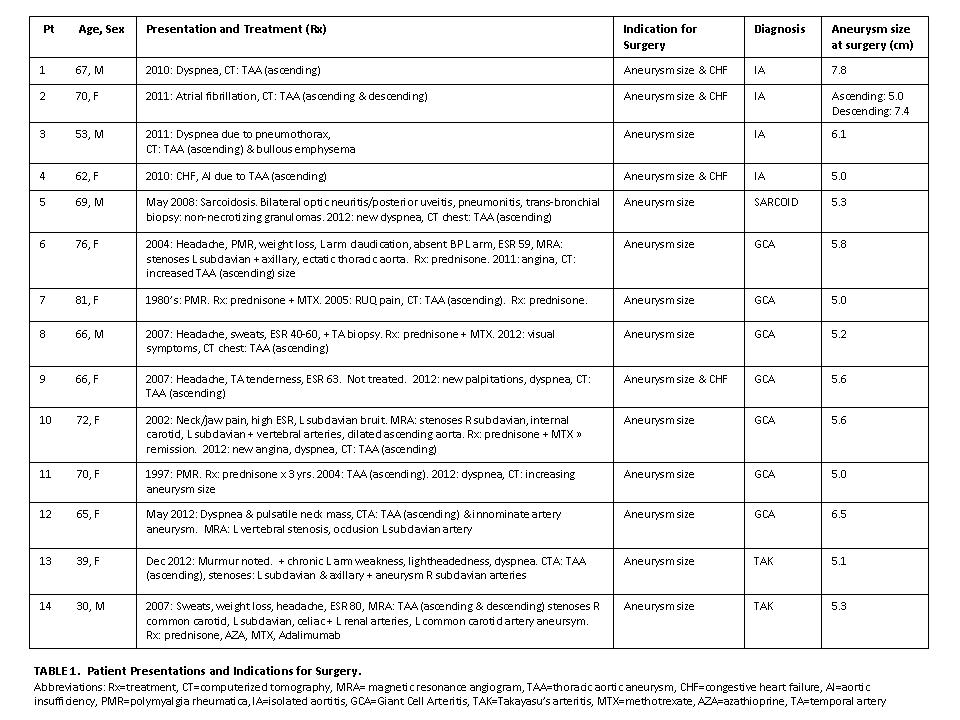Background/Purpose: Thoracic aortic aneurysms due to large vessel vasculitis may be a sign of ongoing inflammation or the sequelae of previous damage to the arterial wall. Ongoing inflammation in the aorta is usually estimated indirectly using clinical features, inflammatory markers and imaging characteristics. Whether these surrogates accurately reflect inflammation within the vessel wall is not known.
Methods: We retrospectively reviewed the clinical, laboratory and imaging data for patients in whom aortitis was histologically demonstrated at the time of reconstruction for thoracic aortic aneurysms (May 2011-December 2012). ACR classification criteria were used to define vasculitis subtype. Pre- and post-operative assessments of disease activity were estimated using the NIH criteria for active disease.
Results: Among 126 consenting study patients who underwent repair of thoracic aortic aneurysms, 14 (11%) had histological features of aortitis. Thirteen specimens (93%) had persistent inflammatory infiltrates, and 1 had features of healed aortitis. Seven patients met criteria for Giant Cell Arteritis, 2 for Takayasu’s arteritis, 4 for Isolated Aortitis, and 1 for Sarcoidosis. Median duration of disease prior to surgery was 35.5 months (range 0-180). At the time of surgery, only 2 of 10 patients (20%) with known systemic disease met criteria for active disease, while the remaining 8 (80%) were felt to be in clinical remission, yielding a sensitivity of 22% and specificity of 100% for the NIH criteria for determining active disease. When assessed over 1 year pre-operatively, 5 of 10 patients (50%) met criteria for active disease, increasing the sensitivity of NIH criteria to 44%. Post-operatively, only 1 of 13 (7%) patients met criteria for active disease. Two patients developed new vascular lesions during follow-up, at median of 3 months post-operatively, and 2 patients died.
Conclusion: At the time of surgery only 20% of patients with aortitis met criteria for active disease based on indirect clinical features, while 93% demonstrated ongoing inflammation on biopsy, indicating that indirect estimates of thoracic aortic inflammation are insensitive in patients with aneurysms. These findings emphasize the need for improved markers for assessing disease activity in patients with large vessel vasculitis.
Disclosure:
A. Clifford,
None;
T. M. Clark,
None;
D. Johnston,
None;
G. Pettersson,
None;
E. Roselli,
None;
E. R. Rodriguez,
None;
E. Soltesz,
St. Jude Medical ,
8,
TransMedics,
9;
L. Svensson,
None;
C. Tan,
None;
G. S. Hoffman,
Vasculitis Foundation,
2,
DSMD from Roche and Sanofi-Aventis,
5.
« Back to 2013 ACR/ARHP Annual Meeting
ACR Meeting Abstracts - https://acrabstracts.org/abstract/large-vessel-vasculitis-estimating-disease-activity-in-patients-with-inflammatory-thoracic-aortic-aneurysms/

